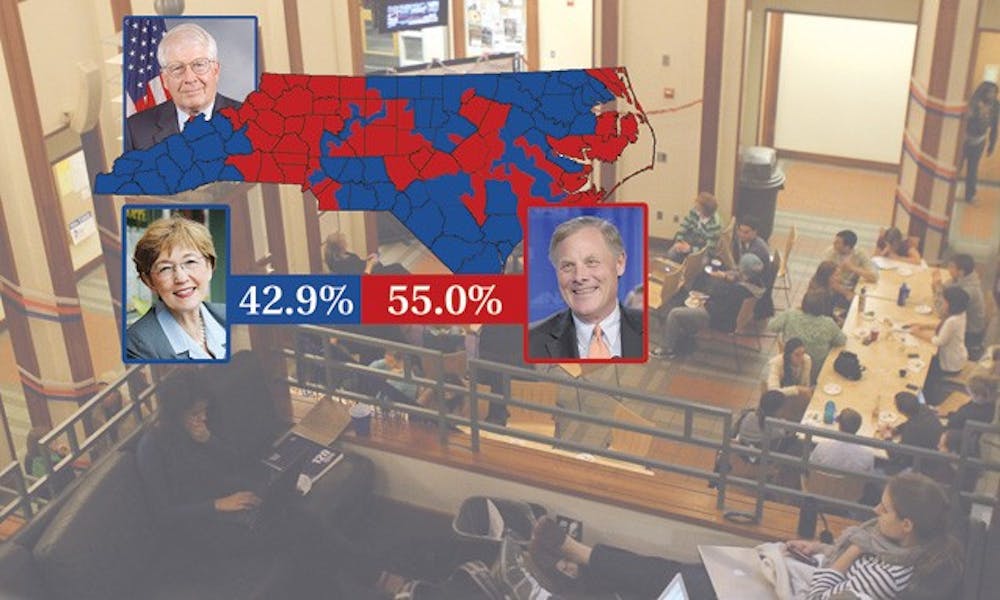Despite significant national change, North Carolina’s and Durham’s voters re-elected their incumbent political leaders in the 2010 midterm elections.
With 55percent of the vote, incumbent Republican Sen. Richard Burr defeated N.C. Secretary of State Elaine Marshall, who won about 43 percent. Rep. David Price, the 11-term Democratic incumbent, defeated Republican challenger B.J. Lawson in the race for the 4th District seat in the House of Representatives by a margin of about 15 percent.
Burr was predicted to retain his Senate seat, according to Public Policy Polling’s final survey for the North Carolina Senate election.
Burr and Marshall had conflicting views regarding Obama’s policies and different ideas about alleviating the economic crisis. Burr, whose election was part of a national Republican tide, has consistently advocated for the repeal of the new health care bill and has vocalized his discontent with the government’s stimulus bill.
A veteran of Congress, Price was also projected to win the House seat by a solid margin—his district, which includes Durham, is largely democratic. Republican candidate Lawson, Engineering ’96 and Medicine ’00, challenged his opponent by running a series of advertisements on YouTube, Facebook and other sites that negatively portrayed Price. Lawson also had substantial financial backing from the Tea Party and an endorsement from conservative commentator Rush Limbaugh.
David Rohde, Ernestine Friedl Professor of Political Science, said the results reflect North Carolina’s political climate. He said he believes the only thing that Marshall could have done to be successful would have been to run in a different year.
“At the national level, North Carolina tilts Republican even if it did vote for Obama,” he said.
Senior Ben Bergmann, president of Duke Democrats, said the election results brought a “terrible blow” to North Carolina because it returns Burr to Washington, D.C. where he can disrupt the Obama agenda.
Bergmann called Burr “one of the most beatable incumbents” in the election, but he added that Marshall’s campaign did not have as much financial backing as Burr’s.
Sam Swartz, communications director for Marshall, said Marshall will continue to work for North Carolina through her role as secretary of state. At the same time, Swartz expressed his desire that Burr focus on improving the economy.
“I hope that now that Republicans have more power, they take responsibility in the mess they helped create,” he said. “We gain nothing from the Republicans standing on the sidelines rooting for failure.”
At the local level, similar trends of the Republican surge were exhibited in the race for the House seat.
Bergmann noted the main goal of Price’s campaign was to combat the trend of reactionary voting against Democratic incumbents.
Jennifer Ellis, Lawson’s meeting manager and event planner, said his campaign was tailored to citizens disappointed with the Democrats’ decisions. Lawson’s campaign manager, Martin Avila, added that the events of the past two years created a political atmosphere that pushed moderates to lean Republican.
Lawson’s platforms directly contradicted Price’s, as Lawson supported cutting back on spending and reforming the existing health care system by removing it from government control. Price, on the other hand, promoted spending on education and research.
Despite the circumstances, Price held onto his House seat on an Election Day that saw many Democratic incumbents lose their positions in Congress.
Avila said he wants to remind Durham and the state that although Republicans took a fall in the House election, they will not surrender.
“Just because we lost this one race doesn’t mean we’re willing to lose the country,” he said. “Our message is not something we will give up and as you can see from the strong republican push nationally. We’re here and we’re not going anywhere.”
Get The Chronicle straight to your inbox
Signup for our weekly newsletter. Cancel at any time.

